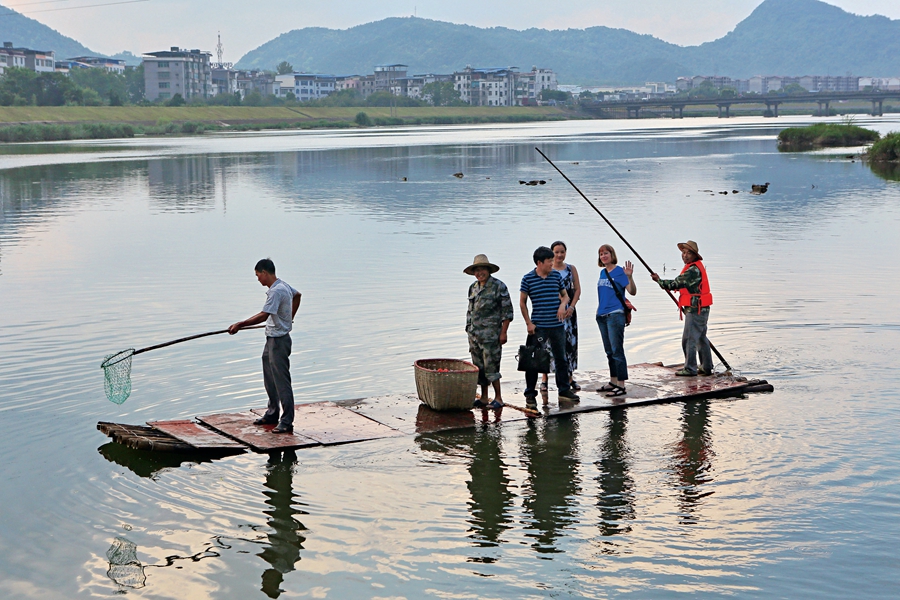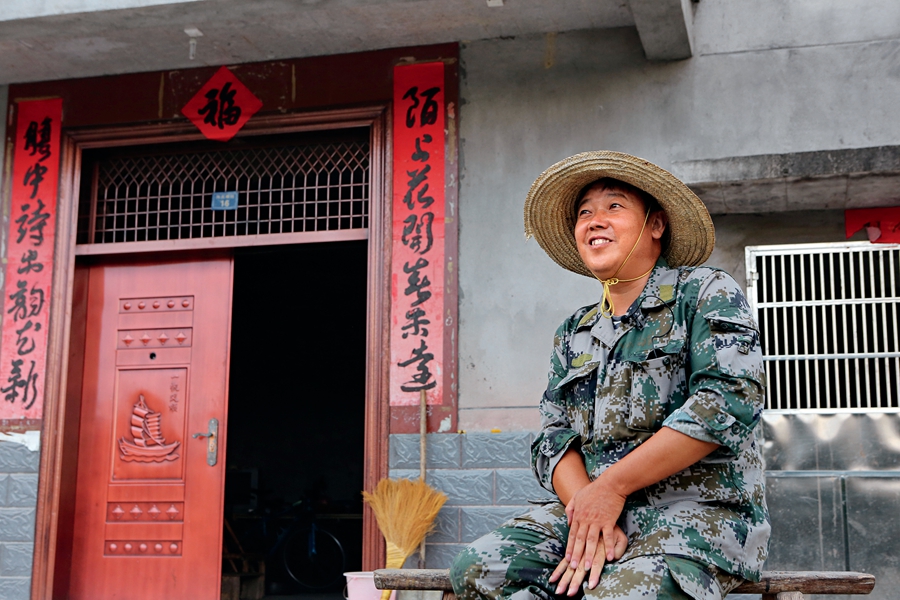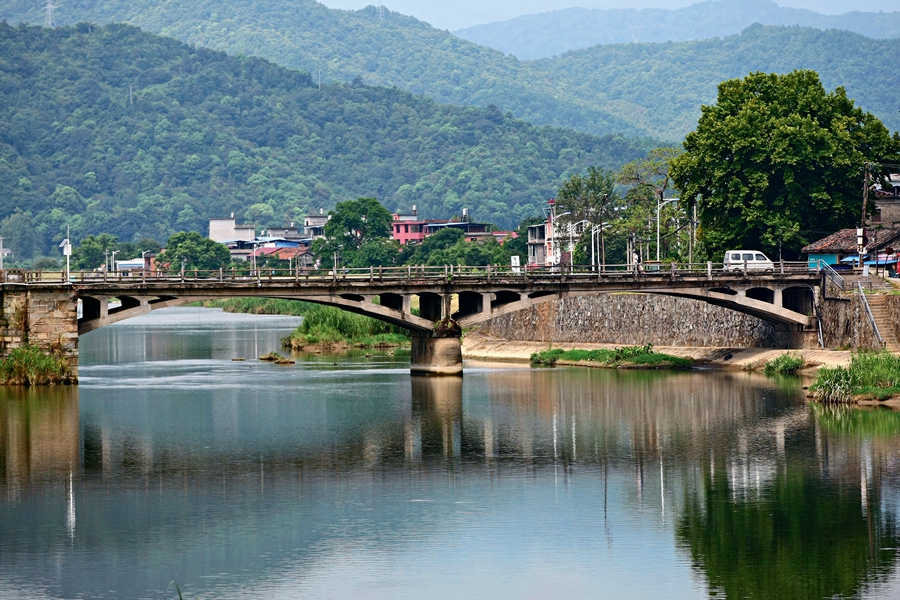Why are the rivers here so clean and beautiful? Although we didn’t trace the source, we did visit every place the rivers run through to find out how the locals fight against pollution and make the water clean again.
“River Chief System”
In January 2015, Jing’an County was selected into the first group of pilot counties seeking innovative ways to improve river and lake management and protection. The trial period lasted for three years, and Jing’an has so far achieved remarkable results in this regard.
Upon arriving at the Beiliao River, adjacent to Jing’an’s county town, we saw some residents washing vegetables and some fishing on the shore. A man patrolled the river on a bamboo raft and sang local folk songs while cleaning up the river.

Journalists survey the Beiliao River atop a bamboo raft with local staff as they clean up the river.
His name is Wang Qiming, who is the head of Hebei Village, Shuangxi Town of Jing’an County, and has been hired for ensuring the water quality of a nearby section of the river. When we saw him, he was picking up trash from the river with a long-handle fishing net and putting them in a big vine basket. “Now even during the flood season, the color of water is at most light brown, but it was red in the past,” said Wang. “When the water level rose, there was white garbage floating on the surface, but now there are no wastes at all,” he added.
After being selected as a pilot county for river management and protection, the local government of Jing’an launched the “river chief system” on August 17, 2015. Local government officials and ordinary people who want to participate in river protection are appointed as “river chiefs,” whose responsibility is to help guarantee the water quality of certain sections of a local river. “Altogether there are 63 rivers with a length over two kilometers respectively in Jing’an County. In the past, the rivers were polluted by illegal industrial dumping and residential sewage,” said Zeng Jianping, deputy head of Jing’an County, who has been appointed as a county-level river chief.
“We trace the source of pollution and clarify responsibilities of relevant parties,” said Zeng. “To protect the ‘mother river’ that nourishes our county, we have made efforts in the following three aspects. First, we ensure pollutants are no longer dumped into the river. We’ve set up sewage treatment systems in every town and developed organic agriculture by promoting bio-pesticide and bio-fertilizers. Our county was selected as a demonstration county for green and low-carbon development. Second, we didn’t launch any new mining projects in the past two years. In addition, we have permanently closed four mines as their operation resulted in soil erosion. Third, we promote garbage classification, recycling, and utilization,” Zeng explained.
According to Wang Shiqin, director of the Office of River and Lake Management and Protection Committee of Jing’an County, and head of the local Water Bureau, the first national conference on “river chief system” was held in Jing’an County from October 24 to 25, 2016, showing that higher authorities have acknowledged the county’s achievements in this regard. Over the past two years, government officials from other places around the country have visited Jing’an over 200 times to learn about their experience of implementing the “river chief system.” “Jing’an was not the first to implement the system, but the system turned out to be a great success here. I think our sound plan and effective measures were essential to guarantee maximum efficiency and our experience can be promoted nationwide. The condition in our county is different from that in developed regions. Our water environment has not been seriously damaged, so we should start by protecting it through the establishment of a long-term mechanism,” Wang explained.
Ordinary People’s Participation
Both government officials and ordinary citizens can be appointed as river chiefs if they want to make contributions to protecting the water condition. Apart from the three grades of river chiefs, who are usually appointed officially, there are also voluntarily claimed river chiefs – ordinary local residents responsible for a river section of around one km long near their houses and villages. They enjoy a series of benefits, such as free bus rides, free movies, and free health check-ups. According to Wang Shiqin, this was the first time that a program involving the efforts of ordinary people was launched as of June 2017. Sometimes, several people compete for one position.

Wang Qiming has been brought on for ensuring clean up of the river that runs through Hebei Village, Shuangxi Town of Jing'an County.
As the water becomes clean and the environment becomes better, more and more tourists come to Jing’an. The total number of tourists to Jing’an hit 8 million in 2016 and the figure surpassed 5 million in the first half of 2017. The boom in tourism has brought about substantial income to local residents, who are in turn willing to help better manage and protect local rivers and lakes. “The condition is quite different now. When I was appointed as a river chief, the river was frequently covered in garbage and it was a total mess on the shore. I started by talking to local villagers and persuading them to help me cleaning the wastes. I had to make similar conversations again and again. It is great that now they understand the importance and are willing to protect the environment. There are altogether 38 ordinary people who have claimed the river chief title in our county and four of them are from our village,” said Wang Qiming.
There is a small subsidy (about a few hundred RMB) to those who have been hired for regular river clean-up efforts. In the past, few people wanted to take the job. Now, people have to compete to get the job. “One reason is that the river is cleaner, so the workload has been reduced a lot. Another reason is that the conservation awareness of locals has been raised,” said Wang.
New Technology Helps
When patrolling the river, Wang took pictures from time to time with his cell phone and sent them to a chat group – a communication platform established by the Office of River and Lake Management and Protection Committee of Jing’an County to connect all relevant staff in river and lake management and protection. When anyone spots problems such as illegal industrial dumping or pollution-related issues, they take pictures and upload them to the platform immediately and the superintendents will respond to different problems.

The ecological environment of Beiliao River has been improved significantly due to the river chiefs’ efforts.
“I patrol for an hour, from seven to eight, every morning. After finishing my regular day’s work, I leave my office at six and patrol the river again before I get home. When I see problems, I will either deal with them directly, or contact the cleaner. We communicate with each other through the platform,” said Wang. “Now, the patrollers often send photos of rivers and lakes to the platform, so that the government officials can monitor the real condition of local water bodies,” Wang added.
The local government of Shuangxi Town also allocated money to install monitoring equipment to watch the surface of rivers and lakes, bordering sections between two villages, and places with a high density population and waterways. In addition, it also installed monitoring and flood prevention video systems, through which the town-level river chief can monitor the conditions of water bodies anytime at the office.
“After inspecting the implementation of the ‘river chief system’ in Jing’an, experts from the World Bank launched a water environment monitoring system, with a total investment of nearly RMB 50 million. Now, they have started to make construction drawings. As soon as the system is installed, the monitoring methods and functions will be substantially improved,” Wang explained.
“The program has provided technical support to improve the ‘river chief system’. In the future, the monitoring system with high tech methods will replace the traditional report by people. New technology will help analyze the water quality and quantity, environment, and the changes to river banks and riverways,” said Zeng Jianping.
Now the water quality in the rivers that run through Jing’an County is rated grade-II under a five-grade system, meaning it is suitable for drinking after certain purification processes such as flocculation, sedimentation, filtration, and disinfection. The water quality only degrades to grade-III when flash floods occur.
To further improve the water environment, the local government of Jing’an County has cooperated with Jiangxi Water Resources Investment Group to promote ecological protection and comprehensive management of the Beiliao River basin. It is foreseeable that with the help of science and technology, the water in Jing’an County will be cleaner and the local scenery will be more beautiful.